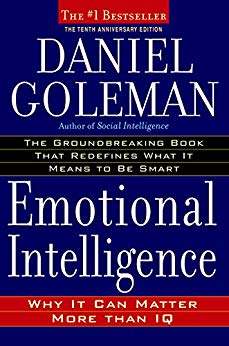

This article is an excerpt from the Shortform summary of "Emotional Intelligence" by Daniel Goleman. Shortform has the world's best summaries of books you should be reading.
Like this article? Sign up for a free trial here .
How to children develop emotions as they get older? How can you, as a parent, teach empathy to your children? Learn in this complete guide.
How Empathy Develops
In the early stages of our development, we cannot tell ourselves apart from anyone else around us–we interpret everything outside ourselves as part of ourselves. This is why babies mirror our facial expressions. Up until about one year of age, infants perceive any distress around them as if it were their own distress.
At around 2.5 years, toddlers can recognize that someone else’s pain is not their own–now, toddlers can begin to develop the skill of comforting someone else. This is generally the point where babies begin to diverge from one another: some babies become very sensitive toddlers, while others become less sensitive.
Something that seems to have a big impact on which direction toddlers go in empathy is how they get disciplined by their parents.
- Discipline that hinges on negative judgements of the offending child–”That’s naughty, you’re bad, don’t do that”–don’t teach empathy, they teach punishment.
- Discipline that hinges on explaining how actions make other people feel–”When you hit her, you made her sad. See how she’s crying?”–teaches empathy and builds a toddler’s awareness of other people’s feelings.
Another influencing factor is how their parents and other people react to emotional distress.
- Toddlers who are yelled at to stop crying will learn that this is how we handle emotions–we punish them.
- Toddlers who see their parents comforting people in emotional distress, allowing emotions to run their course, and discussing what these emotions are and how we can deal with them, will have a much more positive model of how to deal with emotions.
Attunement to Teach Children Empathy
More than the dramatic events we experience as children, our most basic emotional life lessons are influenced by small, repeated life exchanges between us and our parents. Parents can either be attuned to or misattuned to their infants’ emotional states, and thus differ in how they teach empathy.
Attunement is a state where our emotions are responded to by our parents with empathy, acceptance, and reciprocation. It’s more than just imitation. Imitating a baby’s emotions only shows that you see what she did, not that you understand how she felt. To give a baby the sense that their feelings have been understood, you have to play back their feelings to them in a different way.
- For example, if a baby is crying, making a sad face at the baby is just imitation. But making a sad face and then pulling the baby into your arms shows that you actually understood her feelings.
Misattunement, where our emotions are not responded to at all, or responded to with negativity and avoidance, is a deeply upsetting experience for an infant. This is not the way to teach empathy to children.
- When a parent repeatedly shows no empathy with a particular emotion or range of emotions in their child, the child begins to avoid expressing that emotion, and sometimes begins to avoid feeling that emotion at all. A parent’s inability to show empathy can inadvertently destroy entire emotions in their children.
- One mother in a study repeatedly underracted to her baby’s excitement, and eventually the baby became passive: when the baby got excited, he got no reaction from his mother, so he effectively learned there was no point in getting excited at all.
- Similarly, if a parent shows empathy for only a certain emotion or set of emotions, a child will begin to favor this emotion, since it gets a response from their parent. Think of a child who routinely throws temper tantrums–this might be because it’s the only time their parents actually seem attuned to their emotions.
One study found that criminals who’d committed the worst and most violent crimes had an overwhelming commonality: in their early lives, they’d bounced from foster home to foster home or had been raised in orphanages–essentially, they’d been deprived of any attunement or empathy in their early lives.
Conversely, children who suffer sustained and extreme emotional abuse develop a different kind of empathy that ultimately turns into something like PTSD: because they are constantly threatened by others’ emotions, the children develop an obsessive fixation with others’ emotional states, a state of hyper-alert vigilance that can result in intense mood swings that are sometimes diagnosed as borderline personality disorder.
Parents who show empathy to their children teach them to feel empathy and exercise it in their own lives.
(Shortform note: You might be wondering if parents who show too much empathy end up coddling their children–overindulging their emotional states and becoming overprotective of them–but this is a misunderstanding of empathy. Parents who coddle do not demonstrate empathy to their children, they demonstrate an obsessive need to neutralize all negative emotional states, and take the burden upon themselves to do so. Parents who demonstrate empathy allow their children to feel things, help them process what they’re feeling, and then teach them active ways to manage the emotional state on their own.)
———End of Preview———

Like what you just read? Read the rest of the world's best summary of Daniel Coleman's "Emotional Intelligence: Why It Can Matter More than IQ" at Shortform . Learn the book's critical concepts in 20 minutes or less .
Here's what you'll find in our full Emotional Intelligence summary :
- What are emotions? Why do we have them?
- What is emotional intelligence? Why is it important?
- How do you manage your own emotions? Anger, anxiety, and sadness?
- How can you approach your relationships with more emotional intelligence?
- How can you teach your children emotional intelligence?
- How can emotional intelligence boost your career?






